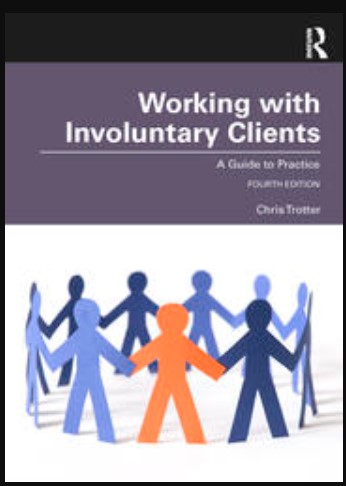Many social workers, probation officers and others in the human services are employed in positions where they deal with involuntary clients. These positions are demanding, and require a specific set of skills. The new edition of this successful book provides an accessible and practical guide for managing difficult and sensitive relationships and communicating with reluctant clients.
The author directly links theory to real-life by adopting a jargon-free and accessible guide to working in partnership with involuntary clients. Written in a lively and engaging style, the book is relevant to students and practitioners and richly illustrated with case examples drawn from a variety of service-user groups, including adult and youth justice and child protection, as well as people with addictions, young people who refuse to go to school and mental health patients who refuse treatment. The author’s integrated and systematic approach promotes prosocial values; emphasizes clarifying roles; and deals with issues of authority and goal-setting.
Fully revised and updated throughout to reflect contemporary research and practice, the book includes new material on collaborative family work as well as an increased emphasis on trauma informed practice. The result is an invaluable practical guide for social work and social care students and professionals to working with both clients and their families.
Contents:
- 1 Introduction
- 2 What works and what doesn’t?
- 3 Role clarification
- 4 Promoting pro-social outcomes
- 5 Problem-solving
- 6 The worker-client relationship
- 7 Working with families
- 8 Evaluation
- Appendix: Principles of effective practice
Author Bio:
Chris Trotter – Monash University
Chris Trotter is Emeritus Professor in the department of social work at Monash University, Australia and Director of the Monash Criminal Justice Research Consortium. Prior to his university appointment he worked for 20 years as a child protection worker, probation officer and manager. He has undertaken more than 30 funded research projects and has more than 100 publications, including three sole-authored and eight edited books. He has a strong international reputation, particularly for his work on pro-social modelling and evidence based work with involuntary clients. Professor Trotter has been invited to more than 15 different countries to present conference plenary sessions and workshops.
Review:
‘Since its first edition . . . Working with Involuntary Clients has been the ‘go-to’ book for practitioners faced with that challenge. This new edition retains the key strength of its predecessors – it insists on clarity, on evidence and on usefulness – but it also adds new material on developing theoretical and practical approaches, making it an even more indispensable source for practitioners and researchers alike.’ Fergus McNeill, Professor of Criminology and Social Work, University of Glasgow
‘This is an important book for anyone working with involuntary clients. It brings together research and practice, in very practical ways, across a range of settings. It will be valuable to practitioners, researchers and professionals interested in knowledge-informed practice.’ – Professor Marie Connolly, Chair and Head of Social Work, The University of Melbourne






